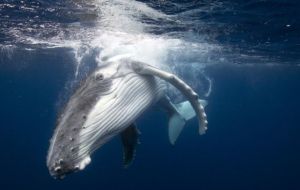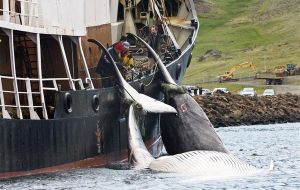MercoPress. South Atlantic News Agency
Japan insists with a “Sustainable Whaling Committee” to replace moratorium on whale hunting
 Japan's “Way Forward” document would create a “Sustainable Whaling Committee” for nations wishing to allow their nationals to hunt whale populations
Japan's “Way Forward” document would create a “Sustainable Whaling Committee” for nations wishing to allow their nationals to hunt whale populations  Brazil is trying to rally anti-whaling nations behind a “Florianopolis Declaration” that insists commercial whaling is no longer a necessary economic activity
Brazil is trying to rally anti-whaling nations behind a “Florianopolis Declaration” that insists commercial whaling is no longer a necessary economic activity Pro and anti-whaling nations locked horns on Monday as the International Whaling Commission (IWC) began meeting in Brazil amid outrage over Japan's proposal to end a three-decade moratorium on commercial whale hunting.
Brazil's Environment Minister Edson Duarte told the opening session it was “time for progress, not setbacks,” reminding delegates of their “duty to give definitive direction to the conservation of cetaceans.”
Incoming IWC chairman Joji Morishita said the meeting could determine the future of the 89-member intergovernmental body, torn for years by nagging disputes between conservationists and whalers.
Morishita said he wants to “change the paradigm to mutual respect from mutual denial,” so the IWC can develop “rather than just fighting with each other.”
But the sides appeared as far apart as ever on the emotive issue of whale hunting as the weeklong meeting got underway in the surfers' paradise of Florianopolis.
Japan is presenting a “Way Forward” document that would create a “Sustainable Whaling Committee” for nations wishing to allow their nationals to hunt healthy whale populations for commercial purposes.
Anti-whaling members like Australia, the European Union and New Zealand have vowed to block them.
Brazil is trying to rally anti-whaling nations behind a “Florianopolis Declaration” that insists commercial whaling is no longer a necessary economic activity and would allow the recovery of all whale populations to pre-industrial whaling levels.
The Brazilian minister said his country was proposing to create a South Atlantic Whale Sanctuary, with partners Argentina, Gabon, South Africa and Uruguay. Previous attempts to introduce a sanctuary in the South Atlantic were defeated by pro-whaling nations.
“We have a duty to give definitive direction to the conservation of cetaceans,” Duarte told the meeting.
“Future generations have the right to know and live in with these beautiful mammals that this Commission deals with in its natural habitats.
Brazil also introduced a draft resolution on ”ghost gear“ entanglement of whales and dolphins by abandoned fishing gear, aiming to further highlight the growing problem ”and to clean up the material already accumulated in the ocean.”
The IWC say the full extent is hard to assess as most entanglements are never observed, but research suggests over 300,000 whales and dolphins die annually due to entanglement in fishing gear, with more becoming trapped in marine debris.
Other key issues being discussed in the meeting are risks to whales of human-made underwater noise pollution, ship strikes and the effects of climate change.




Top Comments
Disclaimer & comment rulesCommenting for this story is now closed.
If you have a Facebook account, become a fan and comment on our Facebook Page!